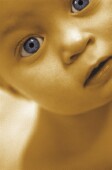- 8 Ways to Increase Dopamine Naturally
- 7 Best Breads for Maintaining Stable Blood Sugar
- Gelatin vs. Collagen: Which is Best for Skin, Nails, and Joints?
- The Long-Term Effects of Daily Turmeric Supplements on Liver Health
- Could Your Grocery Store Meat Be Causing Recurring UTIs?
- Are You Making This Expensive Thermostat Error This Winter?
- Recognizing the Signs of Hypothyroidism
- 10 Strategies to Overcome Insomnia
- Could Artificial Sweeteners Be Aging the Brain Faster?
- Techniques for Soothing Your Nervous System
Babies Born to Moms Over 35 May Have Lower Risk for Certain Birth Defects


Women in their late 30s or 40s are often told that the odds of delivering a baby with a birth defect rises with age.
But a new study suggests that the opposite may be true when it comes to certain types of physical abnormalities.
The study found that women aged 35 and older face a lower risk of having children with birth defects known as major congenital malformations — physical defects that are not caused by abnormalities in chromosomes.
“This study may provide some reassurance to women deciding to delay childbearing and who in other areas — such as genetically and with their own personal medical health — face increasing pregnancy risks,” said Dr. Jill Rabin, chief of obstetrics and gynecology at Long Island Jewish Medical Center in New Hyde Park, N.Y. She was not involved in the study.
The findings were to be presented Thursday in New Orleans at the annual meeting of the Society for Maternal-Fetal Medicine.
“As more women are choosing to delay childbearing, they are faced with many increased pregnancy risks,” study co-researcher Dr. Katherine Goetzinger, an assistant professor of maternal-fetal medicine at Washington University in St. Louis, explained in a society news release. “Findings from this study may provide some reassurance for these women regarding the likelihood of having an anatomically normal child.”
It’s already known that older women face a higher risk than younger women of giving birth to babies with chromosomal abnormalities, which include conditions such as Down syndrome. But according to the study team, it’s been less clear if being an older mother boosts the risk of major congenital malformations.
Little information has been available regarding the association between age of the mother and the risk for birth defects that affect different parts of the body, such as the heart, brain, kidney, bones or digestive system, the authors noted.
In the new research, Goetzinger’s team studied the results of second-trimester ultrasounds for more than 76,000 women.
The researchers found that older mothers — aged 35 and older — were 40 percent less likely than younger mothers to have a child with one or more of the birth defects known as major congenital malformations. The researchers reached this number after adjusting their statistics so they wouldn’t be thrown off by high or low numbers of women with certain risk factors.
The rate of heart defects were similar in both groups, the investigators found, but there were lower rates of brain, kidney and abdominal wall defects.
Two other obstetrics experts had mixed views on the research.
Dr. Jacques Moritz is director of the division of gynecology in the department of obstetrics and gynecology at Mount Sinai St. Luke’s Roosevelt Hospital in New York City. He called the study “weak” because “they are looking at mothers in the second trimester — many of the 35-year-olds [and older] will have had a miscarriage or not even gotten pregnant due to age.”
But, he added, “I do agree that if the older mother did get to the second-trimester ultrasound they have a better outcome.”
Dr. Joanne Stone, director of maternal-fetal medicine at Mount Sinai Hospital in New York City, said the study “provides good news for women who are considered of ‘advanced maternal age’ who are pregnant.”
Stone pointed out that “while the cause of this decrease [in certain birth defects] is not known, it certainly is encouraging news for women who delay childbearing until a little later in life.”
Experts note that findings presented at medical meetings are typically considered preliminary until published in a peer-reviewed journal.
More information
For more information on birth defects, head to the March of Dimes.
Source: HealthDay
Copyright © 2026 HealthDay. All rights reserved.










